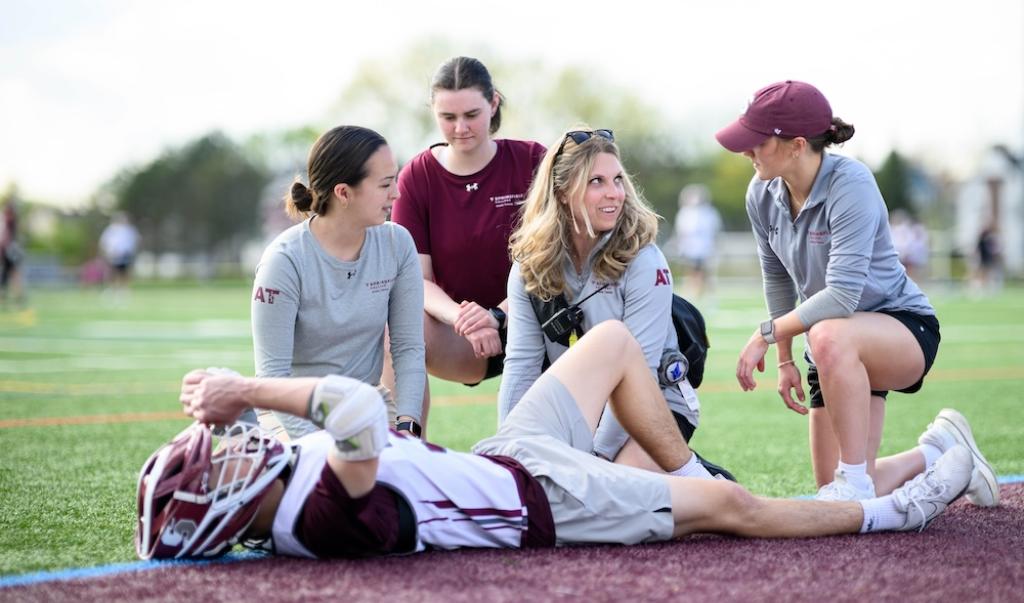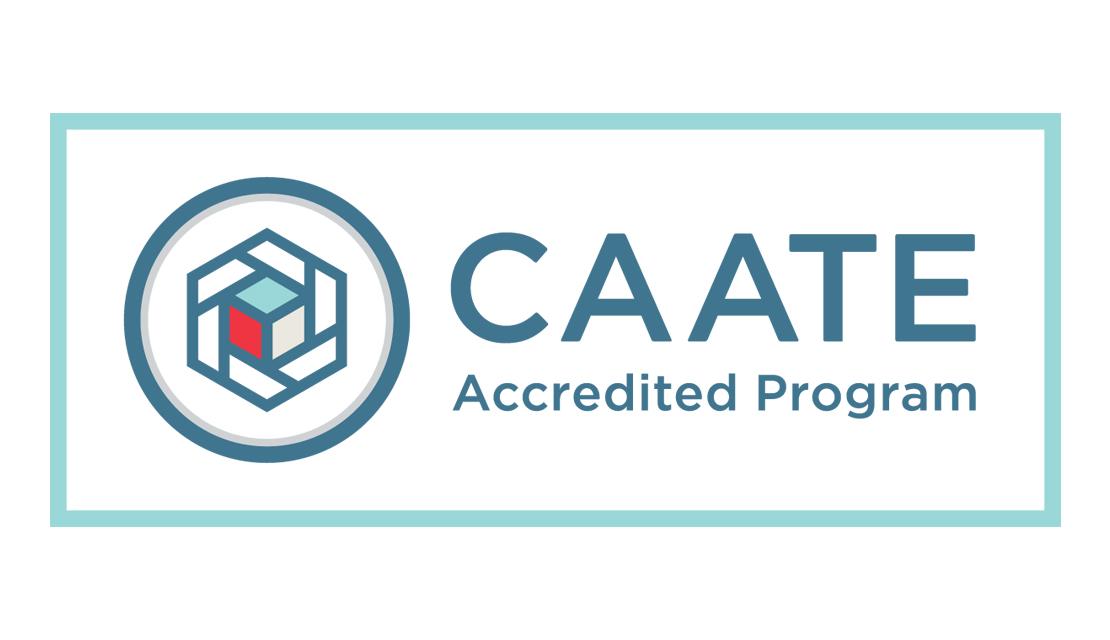Athletic Training Professional Preparation
| About This Program | |
|---|---|
|
Admissions Contact
Rachel Ahlmeyer Are you an International Student? |
|
|
Program Contact
Jessica Barrett, PhD, LAT, ATC |
|
Curriculum and Delivery
|
|
Start Dates and Duration
|
|
| Graduate Success and Careers | |
| Paying for Your Education | |
| Searching for information on AT Residency program? | |
|
Searching for undergraduate programs?
We also offer a BS in Pre-Professional Athletic Training |
|
| Upcoming Athletic Training Events | |
|
Follow us on Instagram |
|

Prepare for a Holistic Approach to Healing.
Springfield College emerged as a leader in athletic training education in 1925 when we first began offering prevention and care of athletic injury courses.
The MS in Athletic Training at Springfield College is designed for students who wish to gain the skills, knowledge, and experiences needed to provide quality health care to those engaged in physically active lifestyles. Graduates of the program are eligible to sit for the Board of Certification for the Athletic Trainer (BOC®) examination. After successful completion of this exam, graduates will be a Certified Athletic Trainer (ATC). Most states also require licensure in order to practice.
Throughout this challenging, yet rewarding 24-month program, students are engaged in a mix of classroom, laboratory, online/hybrid, group project, and clinically based educational experiences. Students learn cutting edge techniques in athletic training theory, evaluation and treatment techniques, clinical reasoning, research, patient care, communication, administration and teamwork.
Fully encompassing the College’s Humanics philosophy, the MS in Athletic Training emphasizes that health and learning are best gained through an approach that unifies Spirit, Mind, and Body. The typical Springfield College-educated athletic trainer is prepared to utilize a holistic approach in providing health care, leadership and service.
How to Apply:
Prerequisite and Foundational Courses
The following prerequisite and foundational courses with grades of a "C" or higher are required of all applicants:
- Biology*
- Chemistry*
- Physics*
- Psychology
- Anatomy and Physiology*
- Statistics
- Biomechanics
- Exercise Physiology*
- Nutrition
*must include a laboratory
Admissions Requirements
- Complete either of the following:
- Online application: Once your application form is processed you will receive an email with your application portal login credentials and instructions for submitting supplemental materials as listed below.
- Apply through ATCAS: We will begin accepting applications for the MSAT direct-entry program in September for enrollment in the cohort beginning the following summer. Completed applications and requirements must be submitted through ATCAS.
- Essay: In two to three double-spaced pages, please describe significant life experiences that have contributed to your interest in your field, your understanding of this field, your occupational objectives, and why you have chosen Springfield College.
- Resume: Please include any college activities, out-of-school leadership experiences, work history, and community involvement to support your interest in or qualifications for graduate study.
- Two letters of recommendation: These are required attesting to the applicant’s academic ability and interest in athletic training. One letter should be from the Athletic Trainer whom the applicant observed, if possible. The other letter may be from a faculty member or supervisor in a healthcare related profession.
- Letters of Recommendation should be uploaded with your ATCAS application.
- Transcripts: A bachelor’s degree from a regionally accredited institution is required in order to advance to graduate-level study. As such, admission to the graduate program may be granted contingent upon successful completion of a bachelor’s degree when a bachelor’s degree is in progress. The bachelor’s degree must be conferred prior to beginning classes as a graduate student.
- Minimum Cumulative Grade Point Average: To receive consideration for admission, applicants must have a minimum overall cumulative average of a 3.0. Applicants may be accepted while still taking prerequisite courses, but enrollment would be contingent upon successful completion of the remaining prerequisites. If an applicant falls below a cumulative average 3.0 after being accepted, they may still be admitted to the College under probationary status. Probationary acceptance requires the student to earn a minimum 3.0 GPA in the first summer semester of the MSAT program or they will be dismissed from the program. Students within probationary status who earn a 3.0 in their first summer semester will have probationary status lifted.
- Current Emergency Cardiac Care Certification: Current Emergency Cardiac Care certification at the Professional Rescuer/Basic Life Support (BLS) Level is required and must include:
- 1 and 2 person CPR (adult, child and infant),
- Airway Obstruction, and
- Barrier Devices and AED Training
- Documented Observations: Applicants with previous employment as a health care provider must have 20 hours of documented observations with an athletic trainer. Applicants without previous employment as a healthcare provider must have 50 hours of documented observations with an athletic trainer.
International Applicants
- $100 non-refundable International Application fee
In addition to the above admissions requirements, all international applicants from non-English-speaking countries are required to submit:
- Proof of English language proficiency by way of the TOEFL or IELTS: Other tests may be accepted on a case-by-case basis. Please refer to our language requirements for more information on acceptable tests, minimum scores, exemptions, and conditional acceptance. If your undergraduate degree was earned in the United States and you successfully completed college-level English, we will consider English language proficiency met.
- Please note: Transcripts must be in English. If the transcript is not in English you will be required to submit a professional credential evaluation completed by any member of the National Association of Credential Evaluation Services (NACES). For this we recommend SpanTran, with its customized portal for Springfield College applicants. World Education Services or Josef Silny & Associates, Inc. are also recommended for your credential evaluations.
The Office of International Admissions can assist you with questions you may have about enrolling at Springfield College as an international student by emailing intladmissions@springfieldcollege.edu.
Application Deadlines
Domestic Students:
- Applications are reviewed on a rolling basis as space is available.
International Students:
- Application and Supporting Materials Deadline: February 1
Transfer Credits
Normally, all work for a master’s degree is done at Springfield College. No more than nine semester hours of graduate credit may be transferred from one or more other institutions toward the master’s degree. Courses accepted for transfer credit must be completed during the five-year period of candidacy, have a grade of B or better, and be applicable to the individual’s program of study pursued at Springfield College. Additionally, such courses must carry graduate credit at an accredited institution with a notation to that effect on the official transcript.
Transfer courses will be evaluated on a case-by-base basis by the Program Director. Such evaluation may also require the submission of a course syllabus and course assignments. Courses accepted for transfer credit can only be used to meet core requirements. An official transcript from each college/university attended is required.

